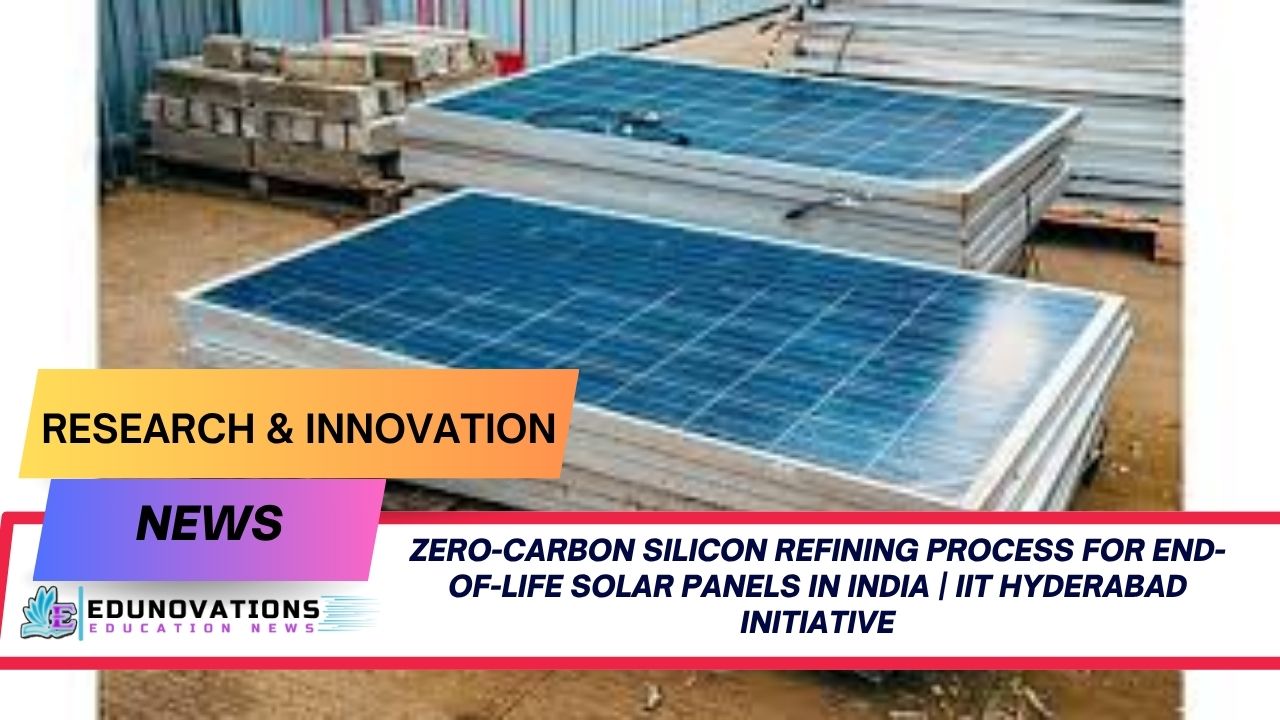Discover how IIT Hyderabad and global partners are pioneering a zero-carbon silicon refining process for end-of-life solar panels in India to promote sustainable energy and a circular economy.
Introduction
In a remarkable step toward sustainable energy innovation, the Indian Institute of Technology Hyderabad (IITH) has joined an international consortium to develop a zero-carbon silicon refining process for end-of-life solar panels in India. This project aims to revolutionize how the world recycles and refines silicon—an essential component of solar cells—while significantly reducing carbon emissions during the recycling process.
The initiative, titled SiZero, is spearheaded by Swinburne University of Technology, Australia, and includes academic and industrial partners from India, Australia, Indonesia, and the United States. With this collaboration, IIT Hyderabad continues to demonstrate its commitment to the Make in India mission and India’s clean energy transition goals.
India’s Solar Challenge: Managing End-of-Life Solar Waste
India’s solar energy sector has seen exponential growth over the last decade. According to the Ministry of New and Renewable Energy (MNRE), India’s installed solar capacity surpassed 82 GW in 2025, making it one of the largest solar markets globally. However, the flip side of this success story is the increasing volume of end-of-life solar panels.
By 2030, India is expected to generate 1.8 million tonnes of solar panel waste, as per IRENA (International Renewable Energy Agency) estimates. Managing this waste sustainably is not just a logistical challenge—it’s a pressing environmental necessity. This is where IIT Hyderabad’s participation in SiZero becomes critical.
The SiZero Consortium: A Global Vision for Sustainable Silicon
The SiZero project is a multi-institutional research initiative aimed at developing sustainable, circular-economy solutions for solar panel recycling. At the heart of this program lies the ambition to produce high-purity silicon using zero-carbon technologies.
The consortium brings together expertise from top global institutions:
- Swinburne University of Technology (Australia) – Project Lead
- Indian Institute of Technology Hyderabad (India) – Research Partner
- University of Queensland (Australia)
- University of California, San Diego (USA)
- Institut Teknologi Bandung (Indonesia)
This powerful collaboration blends material science, electrochemistry, and industrial engineering to create a scalable solution that aligns with international sustainability goals.
IIT Hyderabad’s Role: Leading from the Front
At IIT Hyderabad, the research team is focusing on refining recovered silicon from used solar panels to match the quality of virgin materials. The institute’s researchers are working on developing electrochemical refining methods and exploring innovative Electro Slag Refining (ESR) techniques to eliminate impurities without producing greenhouse gases.
According to Prof. B. S. Murty, Director of IIT Hyderabad, the institute’s involvement in SiZero is “a proud moment for Indian academia and a vital contribution toward sustainable energy technologies.” He emphasized that the collaboration not only strengthens India’s research footprint globally but also helps build domestic technological capabilities in the solar materials supply chain.
The Science Behind Zero-Carbon Silicon Refining
Traditional silicon refining processes involve energy-intensive smelting methods that emit large amounts of carbon dioxide. In contrast, the SiZero approach leverages electrochemical and slag-refining technologies, which significantly reduce or eliminate carbon emissions during production.
Key scientific goals of the project include:
- Developing electrochemical cells capable of operating efficiently at high temperatures for silicon purification.
- Designing carbon-neutral refining systems using renewable electricity sources.
- Enhancing silicon recovery yield from discarded photovoltaic (PV) modules.
- Establishing life-cycle assessments (LCA) for environmental and economic feasibility.
The development of a zero-carbon silicon refining process for end-of-life solar panels in India could transform the global solar recycling industry and make India a hub for sustainable technology innovation.
Circular Economy and the Future of Solar Waste Management
A circular economy framework is central to the SiZero project. It envisions a world where solar panels are not discarded as waste but re-entered into the production cycle as raw materials. By refining and reusing recovered silicon, India could substantially reduce its dependence on imported materials.
This model supports the National Solar Mission and aligns with India’s Net Zero 2070 commitment. Furthermore, the initiative echoes the government’s ‘Waste to Wealth’ vision, promoting self-reliance in clean energy infrastructure and material production.
Industrial and Economic Impact
The SiZero initiative is not just about environmental benefits; it also has massive industrial implications. Developing cost-efficient, carbon-neutral refining technology could:
- Boost India’s domestic solar manufacturing capacity.
- Generate new green-technology jobs in recycling and materials science.
- Strengthen public-private partnerships in renewable energy.
- Encourage foreign direct investment (FDI) in India’s clean technology sector.
As the cost of renewable materials continues to drop, recycling end-of-life solar panels will become not just sustainable but also profitable.
Expert Insights on India’s Leadership
Dr. R. Narayan, an energy policy expert at the Council on Energy, Environment, and Water (CEEW), stated,
“IIT Hyderabad’s participation in a global consortium for silicon refining shows that India is not just a consumer of clean energy but a developer of green technologies.”
Similarly, Prof. Alan Duffy, astrophysicist and Director of Swinburne’s Space Technology and Industry Institute, emphasized that,
“The SiZero consortium represents how international collaboration can drive breakthrough innovations for a truly circular solar economy.”
These expert insights underscore how collaborative research between India and its global partners can contribute meaningfully to climate resilience and sustainable development.
Integrating Research with Policy
IIT Hyderabad’s SiZero participation provides valuable data and innovations that can influence policy frameworks related to electronic waste, renewable energy, and material recycling. The insights generated from this project will likely inform the National Resource Efficiency Policy and future amendments in solar waste management guidelines by MNRE.
Moreover, this initiative aligns closely with the goals of Atmanirbhar Bharat, supporting indigenous R&D and manufacturing capabilities in advanced materials.
Educational and Skill Development Dimensions
The SiZero project also has educational implications. IIT Hyderabad plans to incorporate modules related to sustainable silicon refining, electrochemical engineering, and materials recovery into its advanced engineering programs.
Students and researchers will gain hands-on experience with emerging green manufacturing technologies, preparing them for roles in India’s expanding renewable energy sector.
For aspirants wanting to explore relevant NCERT-aligned content, readers can refer to the following educational resources:
For ongoing coverage of national and international education news, you can also explore:
If any institution requires a professional school website design, they can reach out to Mart India Infotech for customized education solutions.
The Broader Environmental Significance
Implementing a zero-carbon silicon refining process for end-of-life solar panels in India can drastically lower the carbon footprint of the renewable energy sector. It ensures that solar energy remains sustainable throughout its life cycle—from panel manufacturing to disposal.
As India marches toward its Net Zero targets, innovative projects like SiZero represent the next frontier of clean energy research, demonstrating how academia, industry, and international collaboration can work together to secure a sustainable future.
Conclusion
The partnership between IIT Hyderabad and the SiZero international consortium symbolizes a defining moment in India’s renewable energy journey. By developing a zero-carbon silicon refining process for end-of-life solar panels in India, the nation is positioning itself as a leader in circular energy innovation.
Through sustained investment, research excellence, and global collaboration, India is paving the way for a cleaner, greener, and more self-reliant future—one silicon atom at a time.
Toppers Use Mind Maps to score more than 95%
NCERT Class 11th Commerce Mind Maps
Add to cartOriginal price was: ₹999.00.₹199.00Current price is: ₹199.00.NCERT Class 12th Chemistry Mind Maps
Add to cartOriginal price was: ₹199.00.₹75.00Current price is: ₹75.00.NCERT Class 12th Commerce Mind Maps
Add to cartOriginal price was: ₹999.00.₹199.00Current price is: ₹199.00.NCERT Class 12th Science Mind Maps
Add to cartOriginal price was: ₹999.00.₹199.00Current price is: ₹199.00.NCERT Mind Maps For Class 10th
Add to cartOriginal price was: ₹999.00.₹199.00Current price is: ₹199.00.
Purchase Today
🔍 FAQs
1. What is the SiZero project?
The SiZero project is an international research collaboration focused on creating zero-carbon silicon refining methods to recycle materials from end-of-life solar panels.
2. Which Indian institute is part of the SiZero consortium?
The Indian Institute of Technology Hyderabad (IITH) is the Indian partner in the global SiZero consortium.
3. What is the main goal of the zero-carbon silicon refining process for end-of-life solar panels in India?
The main objective is to refine and recover high-purity silicon from used solar panels without carbon emissions.
4. Who leads the SiZero initiative globally?
Swinburne University of Technology, Australia, is leading the SiZero consortium.
5. How does this project benefit India’s solar industry?
It strengthens domestic manufacturing capacity, reduces import dependency, and promotes a sustainable circular economy.
6. What technologies are used in the SiZero project?
Electrochemical refining, Electro Slag Refining (ESR), and carbon-neutral molten silicon processing are key technologies.
7. How will IIT Hyderabad contribute to SiZero?
IIT Hyderabad will focus on electrochemical refining methods and environmental impact assessments.
8. What are the environmental benefits of zero-carbon silicon refining?
It reduces carbon emissions, promotes material reuse, and minimizes landfill waste from solar panels.
9. How does this initiative align with India’s Net Zero targets?
It supports the Net Zero 2070 mission by enabling sustainable material production in the renewable energy sector.
10. Can the zero-carbon silicon refining process be used globally?
Yes, the technology developed under SiZero is intended for global scalability and commercial deployment.














